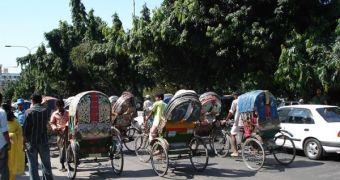Weather experts and climatologists in India warn the central government that authorities should take immediate steps to secure the country's food and water supplies, as the rise in temperature that will affect the nation is unprecedented. Due to increased greenhouse gas emissions, India will soon join China in being one of the largest polluters in the world.
Such a level of carbon dioxide and nitrous oxide emissions is guaranteed to trap even more heat in the atmosphere, which could increase the nation's temperature by about 4°C, as opposed to 2°C, predicted for the rest of the world. All of this could happen by 2100, warns Kankicharla Krishna Kumar, head of the new Climate Change Research Center at the Indian Institute of Tropical Meteorology (IITM).
Until 2040, monsoon levels will not increase significantly enough to guarantee the nation's food and water supplies. Furthermore, deteriorating living conditions will favor the appearance of serious outbreaks, in a population already affected by poverty and severe medical conditions, such as malaria. Underground water supplies will also be affected by hotter days and nights, as will be dozens of animal species.
"Studies have shown that even a one degree rise in temperature can cause a ten per cent reduction in [crop] yield. And we are talking about three degrees change expected in future in India," Kumar said. He argued that the authorities rely on increased, predicted rain fall levels, to help them deal with food and water shortages, but that they don't know that the effects of more rain will be nullified by more heat.
The Intergovernmental Panel on Climate Change (IPCC) announced that India would be affected by more heat and more monsoonal events over the next few decades, due to increased influence from climate change and global warming. Kumar urges national authorities to take immediate actions to avoid potential catastrophes in the future.

 14 DAY TRIAL //
14 DAY TRIAL //